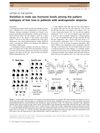 January 2017 in “Springer eBooks”
January 2017 in “Springer eBooks” Over 40% of postmenopausal women experience hair loss, with treatments aiming to stop further loss and possibly thicken hair.

Female hair loss is often hereditary and can be treated with medication, hair transplants, and lasers.

Modern hair restoration techniques can effectively treat hair loss and provide natural-looking results.
 January 2015 in “Вестник дерматологии и венерологии”
January 2015 in “Вестник дерматологии и венерологии” Some treatments like minoxidil, finasteride, and dutasteride are effective for hair loss, but there's no agreed best treatment.
 January 2015 in “Hair therapy & transplantation”
January 2015 in “Hair therapy & transplantation” Some botanical products may help increase hair growth in people with alopecia, but more research is needed.
 December 2014 in “Research and Reviews: Journal of Pharmacology and Toxicological Studies”
December 2014 in “Research and Reviews: Journal of Pharmacology and Toxicological Studies” Cabbage extract in hair gel may promote hair growth and could help treat hair loss.
 September 2014 in “Springer eBooks”
September 2014 in “Springer eBooks” Men and women experience skin aging differently due to changes in sex hormone levels with age.

Chrysanthemum zawadskii extract may help treat hair loss by promoting hair growth and affecting growth factors.
 February 2012 in “Expert Review of Endocrinology & Metabolism”
February 2012 in “Expert Review of Endocrinology & Metabolism” The document suggests more research is needed to understand the link between baldness and prostate cancer.
 January 2011 in “Springer eBooks”
January 2011 in “Springer eBooks” Eating a balanced diet with the right vitamins and minerals is important for healthy hair, but too many supplements can be harmful.
 December 2009 in “DergiPark (Istanbul University)”
December 2009 in “DergiPark (Istanbul University)” Check serum ferritin levels and total blood count for women with diffuse hair loss.
 December 2022 in “Scholars journal of applied medical sciences”
December 2022 in “Scholars journal of applied medical sciences” Dutasteride 0.5mg improves hair growth in 78% of people with hair loss, but may cause sexual problems in some.
 March 2017 in “Journal of Dermatology”
March 2017 in “Journal of Dermatology” Different hair loss patterns may be linked to varying male hormone levels.
 August 2016 in “International journal of scientific research”
August 2016 in “International journal of scientific research” Using minoxidil with finasteride in a cream helps maintain hair thickness after stopping oral finasteride.

Korean patients with androgenetic alopecia may have a higher risk of heart-related health issues and could benefit from early heart screening and healthier lifestyles.
 December 2014 in “Turk Dermatoloji Dergisi”
December 2014 in “Turk Dermatoloji Dergisi” Topical Saw Palmetto and Trichogen Veg Complex increased hair count by 11.9% and improved hair growth in 48% of men with hair loss.
 January 2009 in “Egyptian Journal of Medical Human Genetics”
January 2009 in “Egyptian Journal of Medical Human Genetics” The study suggests that a specific gene variation and higher gene activity are linked to increased baldness in Egyptian men.
 March 2000 in “The Journal of pharmacy technology”
March 2000 in “The Journal of pharmacy technology” Finasteride effectively treats mild to moderate hair loss in men aged 18-41, with some side effects.
 33 citations,
August 2016 in “Indian Journal of Dermatology, Venereology and Leprology”
33 citations,
August 2016 in “Indian Journal of Dermatology, Venereology and Leprology” Dutasteride is more effective than finasteride at increasing hair count and reversing hair thinning in men with hair loss, but both have similar side effects.
 1 citations,
March 2023 in “Scientific Reports”
1 citations,
March 2023 in “Scientific Reports” Finasteride may increase the risk of suicide or severe self-harm in men with mood disorders but not in the general population.
 36 citations,
June 2014 in “PLOS ONE”
36 citations,
June 2014 in “PLOS ONE” Finasteride, a hair loss drug, may cause long-term sexual side effects due to changes in hormone receptor levels.
20 citations,
January 2004 in “PubMed” 3 citations,
November 1998 in “PubMed” June 2021 in “Current developments in nutrition” High doses of finasteride lower cholesterol and body weight in certain mice.
31 citations,
January 2001 in “PubMed” 6 citations,
November 2018 in “Journal of molecular histology” Testosterone increases fluid secretion and aquaporin expression in the vas deferens, which is important for male fertility.
 4 citations,
December 1999 in “PubMed”
4 citations,
December 1999 in “PubMed” Minoxidil and finasteride are promising drugs that can prevent hair loss and promote new growth in people with common hair loss condition.
 3 citations,
September 2023 in “International journal of impotence research”
3 citations,
September 2023 in “International journal of impotence research” Post-finasteride syndrome causes lasting sexual, mental, and physical issues, needing more research for solutions.
1 citations,
December 2022 in “Pharmaceutics” Finasteride-loaded microemulsions can effectively enhance skin delivery for treating hair loss.
 December 2023 in “Magna Scientia Advanced Research and Reviews”
December 2023 in “Magna Scientia Advanced Research and Reviews” The document suggests using trazodone and clomiphene to treat sexual dysfunction caused by post-finasteride syndrome.
























